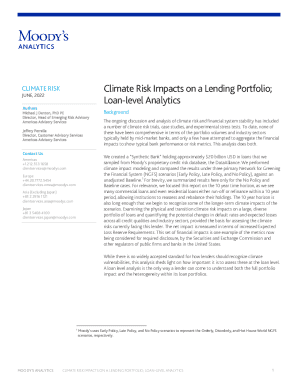How Climate Risk Impacts Your Home Loan Approval

Table of Contents
Understanding Climate Risk Assessments & Their Impact on Lending
Lenders are increasingly incorporating climate risk assessments into their underwriting processes. These assessments evaluate the potential for a property to be damaged or devalued by climate-related events. They use sophisticated models and data to analyze various risks and determine the level of exposure. Lenders use this information to assess the long-term viability of the property as collateral and to manage their own risk exposure to climate change.
- Flood risk assessments: Analyze the probability of flooding based on historical data, geographic location, and future projections.
- Wildfire risk assessments: Evaluate the proximity to wildfire-prone areas, considering factors like vegetation density and historical fire patterns.
- Extreme weather event risk (hurricanes, tornadoes, etc.): Assess the likelihood of damage from high-wind events, heavy rainfall, and other severe weather phenomena.
- Sea level rise assessments: Analyze the potential for coastal erosion and inundation due to rising sea levels, particularly relevant for properties near coastlines.
- Drought risk assessments: Evaluate the risk of water scarcity and its potential impact on property values and insurance costs.
Lenders utilize various data sources, including government agencies like FEMA (Federal Emergency Management Agency) and private companies specializing in climate risk modeling. These models are becoming increasingly sophisticated, incorporating advanced climate science and incorporating higher resolution data for greater accuracy. The improved precision in these models is leading to more nuanced risk assessments and influencing lending decisions more significantly than before.
How Climate Risk Affects Your Property's Value & Loan-to-Value Ratio (LTV)
Properties located in high-risk areas often experience reduced valuations due to the increased likelihood of damage from climate-related events. This directly impacts your ability to secure a mortgage.
- Impact on appraisal values: Appraisers now factor climate risk into their assessments, leading to lower valuations for properties in vulnerable areas.
- Higher insurance premiums: Properties in high-risk zones face significantly higher insurance premiums, increasing the overall cost of homeownership and potentially making the loan less attractive to lenders.
- Reduced loan-to-value (LTV) ratios: A lower appraisal value due to climate risk translates to a lower LTV ratio. This means you may need a larger down payment to secure a loan. A low LTV ratio reduces the lender's risk, but can be a significant hurdle for buyers.
- Difficulty securing a loan if the LTV ratio is too high: If the LTV ratio exceeds lender thresholds, securing a loan may become impossible, even with a good credit score.
For example, a property appraised at $300,000 in a low-risk area might easily qualify for a 90% LTV loan. However, a similar property in a high-flood-risk area, appraised at the same value due to climate risk, might only qualify for a 70% LTV loan, requiring a much larger down payment.
Specific Climate Risks and Their Impact on Home Loan Approvals
Flood Risk
Properties located in floodplains or areas with a high probability of flooding face increased scrutiny from lenders. FEMA flood maps are a crucial tool used to assess flood risk. Lenders often require flood insurance for properties in designated flood zones, and the cost of this insurance can significantly impact the affordability of the loan. Properties with a history of flooding will face even more stringent requirements.
Wildfire Risk
Proximity to wildfire-prone areas can significantly impact loan approval. Lenders assess factors such as vegetation density, historical fire data, and local building codes. Properties constructed with fire-resistant materials might be viewed more favorably. The increased risk of property damage from wildfires can lead to higher insurance premiums and reduced valuations, impacting your ability to secure a mortgage.
Sea Level Rise
Coastal properties are particularly vulnerable to sea level rise. Lenders are increasingly considering the long-term implications of sea level rise, especially for mortgages with longer terms. The risk of coastal erosion, flooding, and property devaluation can make these properties less attractive to lenders, potentially leading to higher interest rates or loan denials.
Mitigating Climate Risk to Improve Your Chances of Loan Approval
Proactive steps can significantly improve your chances of securing a home loan, even in areas with some climate risk.
- Home improvements: Investing in flood mitigation measures (e.g., elevating the foundation, installing flood barriers) or fire-resistant landscaping can reduce risk and improve your chances.
- Purchasing flood or wildfire insurance: Demonstrating a commitment to risk mitigation through insurance coverage can positively influence lender decisions.
- Choosing a property in a lower-risk area: Selecting a property located outside of high-risk zones reduces the likelihood of loan denial and simplifies the approval process.
- Disclosing known risks upfront to the lender: Transparency with lenders about any known climate risks associated with the property fosters trust and enables them to make informed decisions.
Open communication and a proactive approach to addressing climate risk are vital in the home-buying process.
Conclusion
Climate risk is a significant factor lenders consider when assessing home loan applications. Understanding these risks and taking proactive steps to mitigate them can significantly improve your chances of approval. Don't let climate risk derail your dream of homeownership. Research potential properties thoroughly, considering their climate vulnerability, and understand how it affects your home loan application. Learn more about how climate risk impacts your home loan approval by [link to relevant resource/further reading]. Be proactive and secure your future! (Main Keyword variation: Climate Risk and Home Loan Applications)

Featured Posts
-
 Femicide In Mexico And Colombia The Murders Of A Model And Influencer Spark Outrage
May 21, 2025
Femicide In Mexico And Colombia The Murders Of A Model And Influencer Spark Outrage
May 21, 2025 -
 Manhattan Forgotten Foods Festival A Celebration Of Rare Ingredients
May 21, 2025
Manhattan Forgotten Foods Festival A Celebration Of Rare Ingredients
May 21, 2025 -
 Poy Na Breite Efimereyonta Giatro Stin Patra Ayto To Savvatokyriako
May 21, 2025
Poy Na Breite Efimereyonta Giatro Stin Patra Ayto To Savvatokyriako
May 21, 2025 -
 Evenement Musical Le Hellfest Au Noumatrouff
May 21, 2025
Evenement Musical Le Hellfest Au Noumatrouff
May 21, 2025 -
 5 Podcasts Imprescindibles Para Amantes Del Misterio Suspenso Y Terror
May 21, 2025
5 Podcasts Imprescindibles Para Amantes Del Misterio Suspenso Y Terror
May 21, 2025
